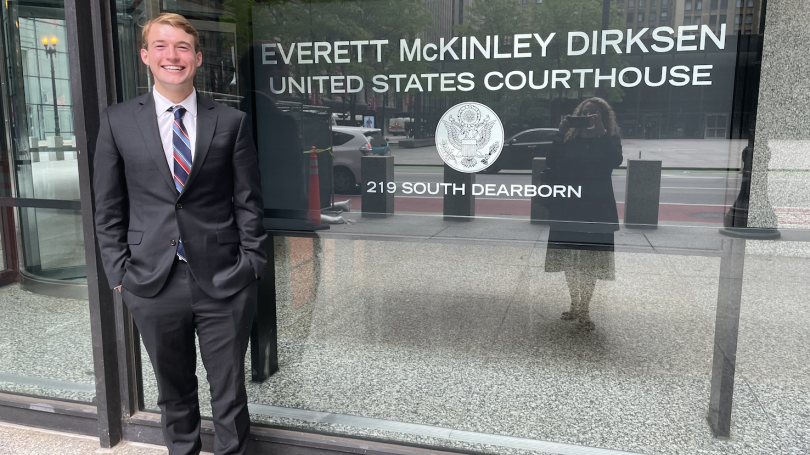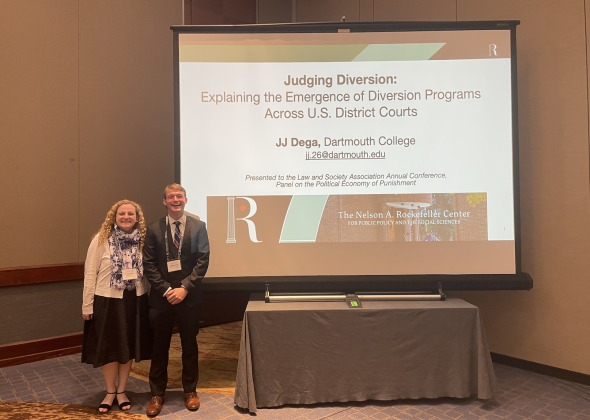

Last summer, Rockefeller Center student and Public Policy Minor JJ Dega '26 was named a Hanlon Scholar and is pursuing research and experiential learning opportunities regarding alternatives to incarceration across the United States over his junior and senior years at Dartmouth. The Hanlon Scholars Program, named for President Philip J. Hanlon '77, celebrates exceptional students and facilitates their development as researchers and leaders on critical community challenges with support from a faculty mentor, resources of up to $20,000, and campus cohort activities.
As part of his work, Dega is studying court diversion programs and is pursuing external methodology training, conference attendance, and internship opportunities within the court system. He will produce a policy brief and advocacy materials to share with actors like the National Center for State Courts and Federal Judicial Center alongside an academic article with his faculty mentor on the diffusion of federal diversion programs.
Dega's interests in the justice system run deep, stemming from his personal experiences, coursework at Dartmouth, and past research conducted for the Rockefeller Center's Class of 1964 Policy Research Shop on the New Hampshire Court Navigator Program and on competency restoration in Vermont.
"I am extremely excited and deeply grateful for the opportunity to pursue justice system reform research as a Hanlon Scholar, with the support of its mentorship program and research grant award," Dega said. "I look forward to travelling to diversion courts to conduct program analyses and helping improve/enact restorative justice policy solutions."
Dega recently had the opportunity to present his research paper at the Law and Society Association's Annual Meeting in Chicago, Illinois.
screenshot_2025-06-09_at_1.44.55_pm.png

He shares his experience below:
"I had the incredible opportunity to present to the Law and Society Association's (LSA) Annual Conference in Chicago, Illinois with the generosity of the Rockefeller Center and Hanlon Scholars Program. LSA is an organization that brings together an interdisciplinary group of social science and humanities scholars – from anthropology to history to law to political science – to discuss topics legal studies topics.
The research I presented has developed from a joint venture between the Rockefeller Center and Hanlon Scholars program. For two years, under the guidance of Professor Elizabeth Pfeffer, PhD, and Professor Julie Kalish, I'm studying the impact of federal diversion programs across the U.S.. These alternatives to incarceration programs intend to address the root cause of an individual's criminal behavior. The court offers criminal defendants the opportunity to complete community-based programming (e.g., housing, drug treatment, counseling, etc.) instead of becoming incarcerated. If defendants complete the program, they are often offered a reduction or elimination of their sentence.
The research presented at the LSA Conference stemmed from the puzzle of why the existence of diversion programs differs so greatly across the 94 U.S. District Courts. In 2023, then-Attorney General Merrick Garland released a rule that all districts should develop a diversion program appropriate for their district court. However, district courts have not universally adopted diversion programs."
Dega's exploration of diversion programs will be enriched by his experience this summer at the U.S. Northern District of Illinois Courthouse, where he will serve as a Rockefeller Center Judicial Fellow. Under the mentorship of Magistrate Judge Beth Jantz '99 and District Court Judge Jorge Alonso P '25, Dega will conduct a policy evaluation of the Sentencing Options that Achieve Results (SOAR) Program, collaborating closely with judges and court stakeholders.
Dega's research is supported by members of the Rockefeller Center faculty with mentorship from Elizabeth Pfeffer, Postdoctoral Research Associate, and Julie Kalish '91, Lecturer in Public Policy.